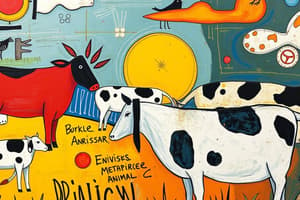Podcast
Questions and Answers
What do Napoleon and Snowball disagree about?
What do Napoleon and Snowball disagree about?
- The windmill (correct)
- The leadership style
- Animal rights
- The food supply
Leadership is considered a pleasurable experience in Animal Farm.
Leadership is considered a pleasurable experience in Animal Farm.
False (B)
What is Boxer's maxim?
What is Boxer's maxim?
Napoleon's always right.
Napoleon genuinely opposed the idea of building the windmill.
Napoleon genuinely opposed the idea of building the windmill.
How did the animals perceive Snowball's actions in battle?
How did the animals perceive Snowball's actions in battle?
The animals were too intelligent to argue about issues they disagreed on.
The animals were too intelligent to argue about issues they disagreed on.
How was Snowball labeled by the other characters?
How was Snowball labeled by the other characters?
The animals were not afraid of the dogs.
The animals were not afraid of the dogs.
The animals were easily persuaded by speakers.
The animals were easily persuaded by speakers.
The windmill was eventually not built.
The windmill was eventually not built.
What does the term 'cult of personality' refer to in the context of Napoleon?
What does the term 'cult of personality' refer to in the context of Napoleon?
The animals felt relaxed and brave during tense situations.
The animals felt relaxed and brave during tense situations.
Study Notes
Disagreements and Leadership
- Napoleon and Snowball frequently clash, highlighting contrasting leadership styles and visions for Animal Farm.
- Leadership is portrayed as a burden, not a privilege, emphasizing the sacrifices required in positions of authority.
Boxer’s Maxim
- Boxer’s belief in unwavering loyalty is encapsulated in the phrase "Napoleon's always right," showcasing blind faith in leadership among the animals.
Deception and Manipulation
- Napoleon's feigned opposition to the windmill serves as a strategic tactic to control the narrative and maintain power.
- Snowball is unfairly demonized, with propaganda portraying him as a criminal, illustrating the use of scapegoats in political power struggles.
Fear and Persuasion
- The presence of intimidating dogs suppresses dissent, signifying how fear is utilized to silence opposition.
- Animals lack the ability to articulate their disagreements, showing a manipulation of thought where they quickly align with dominant voices.
The Windmill Project
- The decision to proceed with the windmill construction reflects a shift in Napoleon’s stance and a central focus on productivity, despite earlier objections.
- The construction of the windmill symbolizes both hope for progress and the exploitation of the animals’ labor.
Cult of Personality
- Napoleon's rise is marked by a spectacle akin to a cult of personality, reinforcing his authoritative position as he commands respect and fear.
- The imagery of Napoleon, supported by dogs, parallels historical leaders who rely on loyal enforcers to project power.
Atmosphere of Fear
- The animals’ retreat into the barn encapsulates their submission and fear, signaling a culture of oppression that stifles open dialogue and dissent.
- The pervasive atmosphere of terror contributes to the overall themes of control and manipulation within the narrative.
Studying That Suits You
Use AI to generate personalized quizzes and flashcards to suit your learning preferences.
Description
Test your knowledge of significant quotes from Chapter 5 of George Orwell's 'Animal Farm'. Each flashcard presents a key phrase that highlights the themes of leadership and conflict within the text. Ideal for students studying themes and character dynamics in this classic novel.




